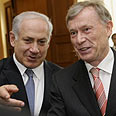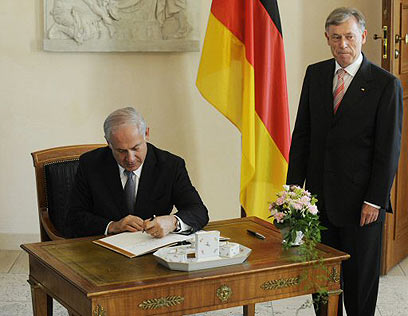
Netanyahu: Abbas made a first positive move
Following meeting with German president in Berlin, prime minister addresses Palestinian leader's willingness to meet with him. 'We must convene and sit down without any preconditions. The main point is the need to recognize the Jewish people's state,' he says
Netanyahu spoke during a press briefing following his meeting with German President Horst Köhler in Berlin.
"I believed such moves should be made," Netanyahu said, referring to Abbas' willingness to meet with him. "I view this announcement as a positive thing, perhaps the first one. I have yet to look into it, but I have said that we must convene and sit down without any preconditions. This is the simplest and most convenient thing for resuming the process," he said.
The prime minister also spoke of his meeting earlier Wednesday with US special envoy to the Middle East George Mitchell in London. "The discussions have moved us forward in the process, but there are still matters which have not been finalized. The talks between us and the US will continue next week. My team will meet Mitchell, and the envoy himself will probably come to Israel during the second week of September.
"My goal is to move forward while balancing between two needs – maintaining the quality of life of the settlements' residents on the one hand, and launching a diplomatic process on the other hand. Progress was made today and there was a good atmosphere. I don’t want to refer to the content of talks, but don't rely on rumors saying that we agreed or did not agree to certain demands."

During meeting with German president (Photo: AFP)
Addressing a report by British Guardian newspaper that the United State and Europe would support sanctions against Iran in return for an Israeli commitment to freeze settlement construction, the prime minister said that "the American attitude towards the Iranian issue stands for itself."
In these remarks, Netanyahu denied a link between sanctions required against Iran and the peace process as one deal. He added, however, "I have said in the past that Iran's armament will cloud over peace. This doesn’t mean we are not doing anything for peace.
"Look what Iran is doing with its emissaries in order to thwart this. Iran is arming Hezbollah to its teeth and Hamas. It's doing it without a nuclear weapon, so what will it do when it does have a nuclear weapon? Anyone who wishes to strengthen peace must bolster the moderates and weaken the extremists. This does not contradict the peace process. These things are completely compatible."
'Core issue – recognizing Jewish state'
As for the possibility that the Palestinians would demand that the negotiations on the core issue begin from the point the talks with the Olmert government left off, Netanyahu said, "They will raise all the issues they consider as core, and we will raise the issues we consider as core.
"I spoke to the German president and told him that the root of the conflict is not in the communities, not in the borders, not in a dispute over one territory or another. This is not the root of the conflict. The root of the conflict is the need to recognize the Jewish people's state, and I used the phrase 'Judenstaat'. I will not let go of this matter. It's a core issue as far as I am concerned."
For the first time, the prime minister addressed demand that Saudi Arabia join the regional process, saying after landing in Berlin, "We need regional peace and normalization. Saudi Arabia is a very important country for establishing peace and strengthening it.
"I can say that if a peace process does open, it must have a regional component, a political one, an economic one, and other fields. We support such a process."
The prime minister said he would raise the Iranian issue in his upcoming meeting with German Chancellor Angela Merkel, whom he praised for her firm and consistent stance on the matter. He added that he would accept French President Nicolas Sarkozy for a conference of Mediterranean Sea countries in France.
Netanyahu also stressed the importance of commemorating the Holocaust. He said he had been very moved when the pilot of the plane which took him from London to Berlin told him that his parents were Holocaust survivors and that he was proud to have flown the Israeli prime minister to Berlin.
The prime minister is accompanied on this visit to Germany by Minister Yossi Peled, a Holocaust survivor whose life was saved by growing up as a Christian till the age of nine. Peled is expected to present his biography to Chancellor Merkel during Thursday's meeting. "He will be closing a circle in a way," Netanyahu said.










